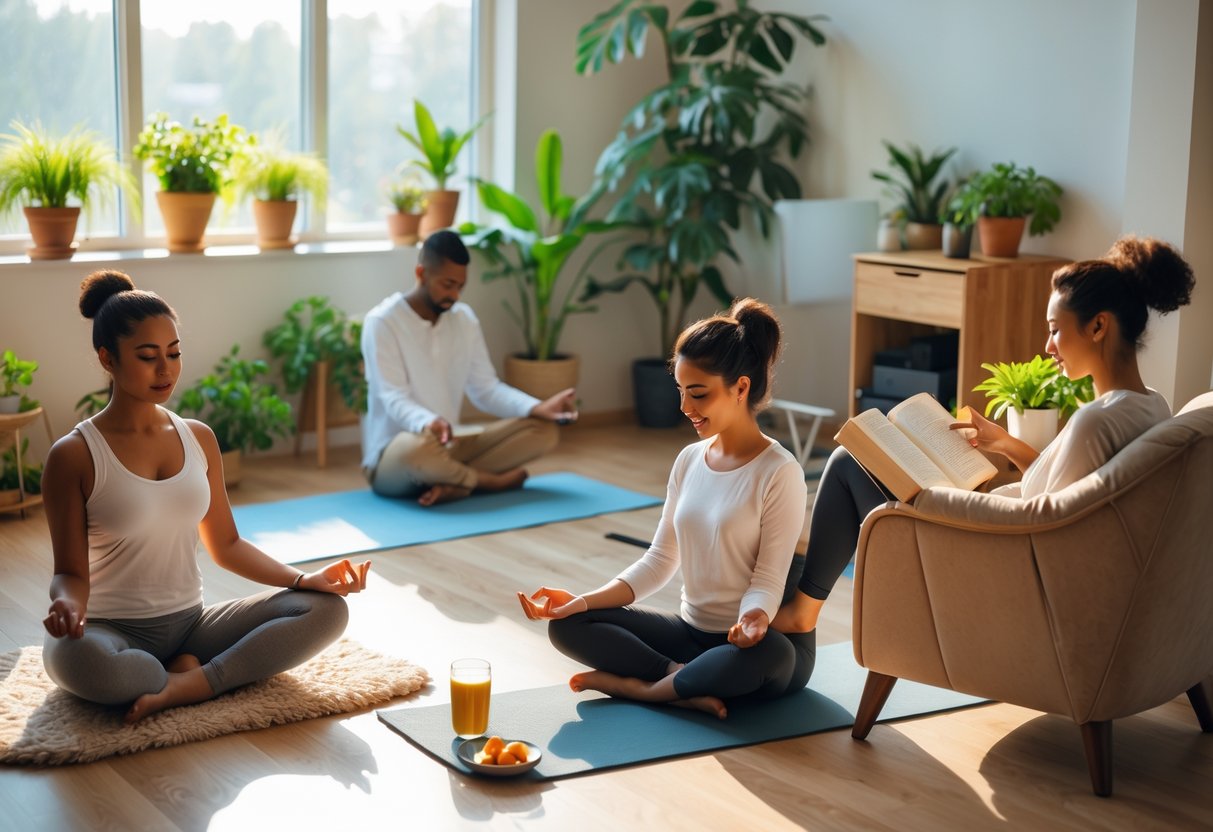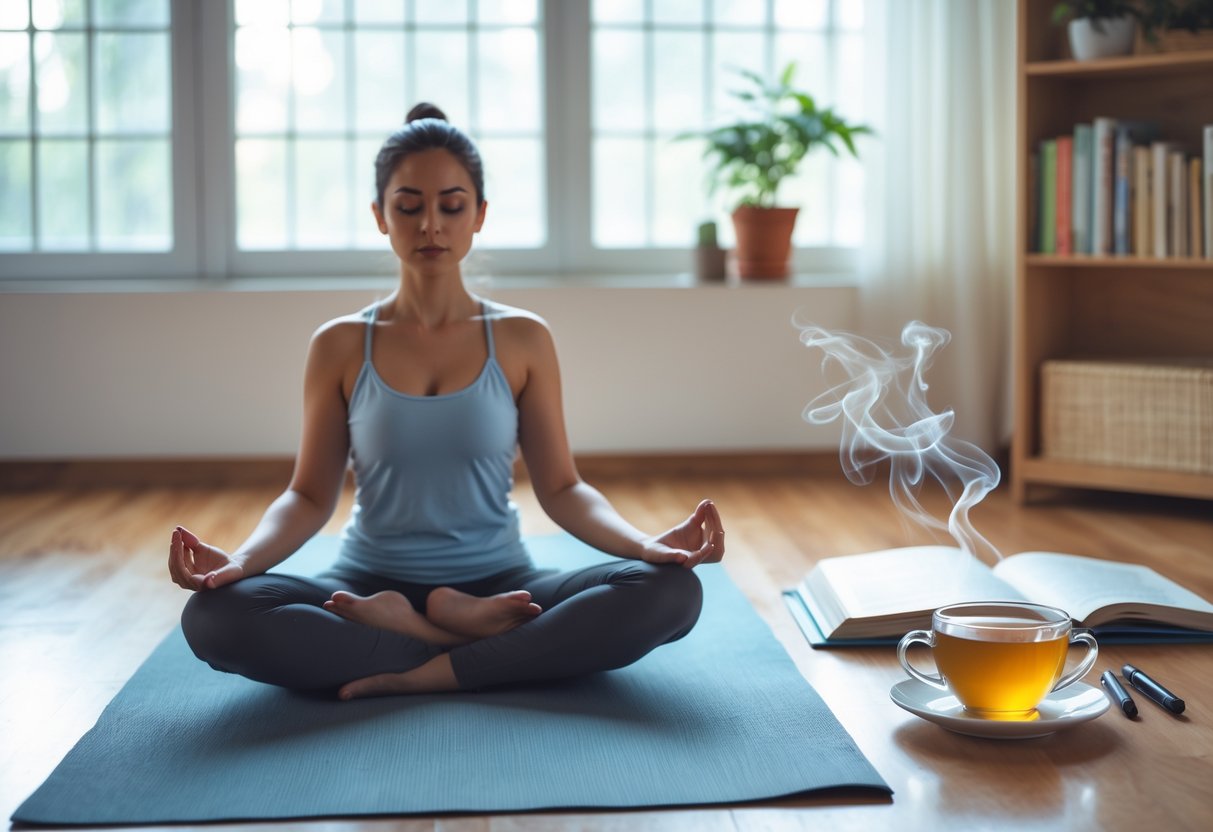We all get stressed or anxious now and then, but adding a few daily habits can really help. Simple things like moving your body, eating well, and practicing mindfulness can lower stress and lift your mood. Changing up your routine doesn’t have to eat up your time or feel overwhelming.

Plenty of research suggests that small changes—like cutting down on screen time, starting your day with purpose, or doing some light exercise—can help you feel a bit more at ease. Activities such as deep breathing or jotting down what you’re grateful for can set a calmer mood. If you’re looking for inspiration, check out habit lists from health experts and wellness pros.
Key Takeaways
- Daily habits shape your stress and anxiety levels.
- Simple routines support emotional balance and self-care.
- Positive sensory experiences can help you relax.
Understanding the Impact of Daily Habits on Stress and Anxiety

The habits you stick to every day really shape how you handle stress and anxiety. Even small actions can support better mental health and spark positive changes in your day.
The Connection Between Habits and Mental Well-Being
Healthy habits can reduce how often you feel stressed or anxious. Stuff like regular exercise, eating balanced meals, and taking breaks helps your mind and body bounce back from challenges. These routines build resilience, so you’re better equipped to handle tough emotions.
When you make good habits part of your routine, you can sometimes stop stress before it really takes hold. Staying active, for instance, often means less tension and more energy. Taking time for hobbies or reaching out to friends can lift your mood and keep negativity in check. Consistency gives you more control over daily life, which usually helps keep anxiety at bay and supports your mental health.
How Small Changes Improve Mental Health
Small tweaks to your daily habits can make a noticeable difference. Limiting screen time, drinking enough water, and getting decent sleep each night all help you handle stress. Even short walks or a bit of deep breathing before bed can relax your mind and body.
Journaling about your thoughts and feelings lets you spot what triggers your stress. Practicing gratitude can lift your mood and ease anxiety. Healthier routines, little by little, add up. Over time, these choices can lead to a steadier, calmer mindset—just ask the experts over at Healthline or the Mayo Clinic.
7 Daily Habits That Reduce Stress and Anxiety

Handling stress and anxiety every day can help you feel calmer and more focused. Habits like mindfulness, special breathing techniques, and carving out time for meditation really do make a difference.
Practicing Mindfulness
Mindfulness is about tuning in to the present moment without judging whatever pops up. Try noticing your breath, the ground under your feet, or the sounds around you.
You might start by sitting quietly for a few minutes, just breathing in and out. If your mind drifts, gently bring your focus back to your breath. Some folks write in a gratitude journal every morning to stay grounded. Many people say mindfulness cuts down stress and anxiety and helps them feel better mentally. It can be as easy as a slow, mindful walk or simply paying attention to your meal.
Diaphragmatic Breathing Techniques
Diaphragmatic—or belly—breathing is a straightforward way to help yourself relax. You take deep breaths so your belly rises with each inhale, telling your brain to chill out and helping slow your heart rate.
To try it, sit or lie down with one hand on your chest and the other on your belly. Inhale slowly through your nose, let your belly rise, and then exhale through your mouth. Do this for a few minutes and you’ll probably feel more relaxed. This approach can lower daily stress. Practicing it a few times a day—especially when things get tense—can lift your mood and support self-care.
Integrating Meditation into Your Routine
Meditation teaches your mind to focus and let go of distractions. Just a few minutes in a quiet spot can make a difference. A lot of people find guided meditations helpful when they’re starting out.
During meditation, sit comfortably and focus on your breath or a calming word. If your mind wanders, just gently bring it back. In time, meditation can ease anxiety and help you feel more at peace. Adding it to your morning or evening routine can make you more resilient to stress. There are plenty of apps and online videos for beginners, so it’s pretty easy to try and stick with it.
Building a Holistic Self-Care Routine
Taking care of your mental health means building daily habits that support both your body and mind. Small changes—like better sleep or more movement—can really make a difference with stress and anxiety.
Prioritizing Sleep Hygiene
Keeping a regular sleep schedule helps your brain and body recover. Going to bed and waking up at the same time—even on weekends—keeps your sleep cycle steady. A dark, quiet, and cool bedroom makes it easier to get good rest.
Cutting back on screens before bed can boost sleep quality. Blue light from phones, tablets, and computers messes with melatonin. Instead, try reading or gentle stretching for half an hour before bed.
Skip caffeine in the late afternoon and evening. Eating big meals or drinking a lot right before bed can make falling asleep tougher. These sleep tips can lift your mood and energy. Learn more about self-care habits.
Physical Activity for Stress Relief
Moving your body lowers stress hormones and boosts endorphins, which improves your mood and mental health. You don’t need a gym—short walks, stretching, or even dancing at home all count.
Pick activities you actually enjoy, and you’ll be more likely to stick with them. Just 20 or 30 minutes of movement a day supports your body’s stress response and builds resilience. Try mixing it up with walking, cycling, swimming, or yoga.
Making time for movement can also help you sleep better, boost your energy, and support your body’s natural defenses against stress. See more benefits of physical activity.
Enhancing Relaxation Through Positive Sensory Experiences
Paying attention to what you see, hear, and feel can shift how you handle stress. Some sensory experiences—like calming sounds or gentle activities—give your brain a break and help you feel a little better.
The Calming Power of Music
There’s something about listening to soothing music that just melts away stress and brings a bit of peace. Slow, gentle melodies seem to settle the nervous system and even slow your heart rate a little. After a hectic day, it honestly gets a lot easier to unwind with the right tunes.
Classical music and soft instrumental tracks tend to ease anxiety for many people. Sometimes just singing along or humming can make you feel calmer—funny how that works. Picking songs that feel familiar or comforting really makes a difference, too.
If stress keeps creeping in, putting together a playlist of relaxing songs might help more than you’d expect. Research points to music as a real tool for handling tension and supporting mental well-being. Maybe try listening in the morning, during a quick break, or right before bed—see if it sets a calmer mood for the day or night.





[…] daily stretch routine can actually take the edge off lower back […]
[…] exercise, good sleep, stress management, certain foods, and a few proven supplements all play a direct role in keeping testosterone where […]
[…] tend to happen when you just focus on what’s happening right now. Living in the moment can really cut stress, boost awareness, and open up more room for joy in everyday […]
[…] low here, you might see grey hairs sooner or notice slower hair growth. Keeping up with nutrition, managing stress, and moving your body regularly can help keep this reserve […]